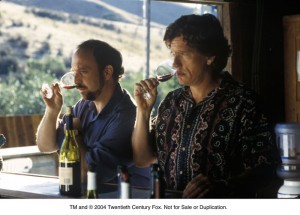Sideways – 2 guys, one looking for love, the other hunting for sex

we'll pull with this one
![]()
Sideways – Director Alexander Payne
Colours to the mast. I hated About Schmidt (Review in Archive). Sideways is much better, but its spirit and emotional tone make it very much a companion piece. Both pose the question: is pathos enough to drive a movie? I’d always thought of pathos as a bit like happiness: something that happens when you are pursuing something else. In Sideways, as in AS, it is as if director Payne is aiming for pathos at the outset. However, unlike AS, he does, in the last half hour of Sideways, sort of hit the mark. Nerdy, wine bore Miles, does emerge as a sympathetic character but the strength of this is undermined by Payne setting him up as pathetic from the start.
The emotional tone of the film is therefore, muddled and keeps sending mixed messages from the very beginning, especially about Miles. For example: what are we supposed to make of his love of wine? Early on he is the worst kind of wine-snob bore, showing off with his talk of “just a flutter of edam” to brain-dead, loins-live Jack whose sole interest in wine is confined to how many glasses it takes to get laid. Yet in a nicely written later scene where Miles and Maya have withdrawn discreetly to the porch while Jack and Stephanie indulge in some noisy wine-treading in the bedroom, Maya’s passion for wine and Miles’s appreciation of it, seems very real and truthful. The superb performances just about overcome the implausibility of the characterisation and the frequent weakness of the writing.
It is clear that Payne’s instincts and sympathies are with Miles and Maya. That’s OK, but the consequence is that Jack for example is very lazily written. He is just too brain-in-his-pants dumb to provide the right kind of foil for what Payne appears to want to do with the movie and the central relationship that drives it. Serious suspension of disbelief is necessary to buy into this ‘friendship’. They simply don’t share enough emotional common ground to make their different attitudes to sex and relationships overlap enough to be interesting. As written, Miles’s real feeling for Jack is contempt and Jack’s for him exasperated disbelief. The device of them having been freshman flatmates just can’t bear the weight.
Hey Z – lighten up: it’s a comedy. Well I agree there are a couple of sublime moments in the film which are worth the price of admission in themselves. One a perfect sight gag and the other a genuinely laugh-aloud comic situation so strong it gives you after-chuckles as you drive home. But, if it’s a comedy, why do we wait for so long to smile? Unless of course the incidents of toe-curling embarrassment for Miles earlier float your chuckle-boat. This is Focker country and for me they have all the humour of a cruel practical joke on the weakest member of the group.
In the end, my problem with the movie is that Payne does not seem to be able to make up his mind what he wants it to be. As a comedy, for the first hour they forgot the funny; a flash of brilliance, and then it runs out of time. As a bitter-sweet, wry observation of the trials and tribulations of a nice, ordinary but shy guy, Payne sabotages his own character: Miles’s novel-writing is less sad than laughable, and we see virtually nothing of his life as a teacher which might have given him some soil in which a few roots of empathy might grow. In the end, Sideways is for me, just as manipulative as After Schmidt, with a sort of inverted sentimentality of spirit that sadly undermines some genuinely touching moments. The basic narrative structure is I think the problem. You can hang a broad comedy on the idea of two unlikely friends on a last-fling trip; the one to get laid, the other to find love. But if you want, as I think Payne does, to go deeper, then their journey surely must have a more purposeful, less crass objective. If you want a movie that succeeds magnificently in achieving a profound sense of true pathos throughout, get The Straight Story out on DVD. There the journey in question has a real, emotionally charged, serious purpose. The pathos emerges from the interplay of real character and convincing narrative, it is not for a second the conscious objective of the director in the first place.
(March 2005)
Filed under: 3 star, Alexander Payne, Comedy, General, Hollywood, Humorous

